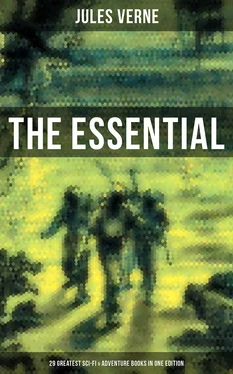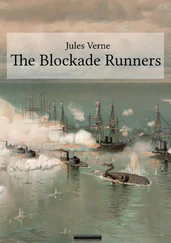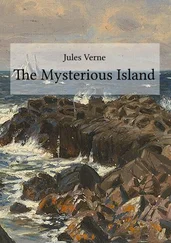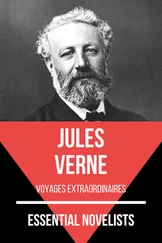“Robert and I,” he added, jestingly, “thought ourselves hunting in the open forest. I was afraid, for the minute, we should lose ourselves, for I could not find the road. The sun was sinking below the horizon; I sought vainly for footmarks; I began to feel the sharp pangs of hunger, and the gloomy depths of the forest resounded already with the roar of wild beasts. No, not that; there are no wild beasts here, I am sorry to say.”
“What!” exclaimed Glenarvan, “you are sorry there are no wild beasts?”
“Certainly I am.”
“And yet we should have every reason to dread their ferocity.”
“Their ferocity is nonexistent, scientifically speaking,” replied the learned geographer.
“Now come, Paganel,” said the Major, “you’ll never make me admit the utility of wild beasts. What good are they?”
“Why, Major,” exclaimed Paganel, “for purposes of classification into orders, and families, and species, and sub-species.”
“A mighty advantage, certainly!” replied McNabbs, “I could dispense with all that. If I had been one of Noah’s companions at the time of the deluge, I should most assuredly have hindered the imprudent patriarch from putting in pairs of lions, and tigers, and panthers, and bears, and such animals, for they are as malevolent as they are useless.”
“You would have done that?” asked Paganel.
“Yes, I would.”
“Well, you would have done wrong in a zoological point of view,” returned Paganel.
“But not in a humanitarian one,” rejoined the Major.
“It is shocking!” replied Paganel. “Why, for my part, on the contrary, I should have taken special care to preserve megatheriums and pterodactyles, and all the antediluvian species of which we are unfortunately deprived by his neglect.”
“And I say,” returned McNabbs, “that Noah did a very good thing when he abandoned them to their fate—that is, if they lived in his day.”
“And I say he did a very bad thing,” retorted Paganel, “and he has justly merited the malediction of SAVANTS to the end of time!”
The rest of the party could not help laughing at hearing the two friends disputing over old Noah. Contrary to all his principles, the Major, who all his life had never disputed with anyone, was always sparring with Paganel. The geographer seemed to have a peculiarly exciting effect on him.
Glenarvan, as usual, always the peacemaker, interfered in the debate, and said:
“Whether the loss of ferocious animals is to be regretted or not, in a scientific point of view, there is no help for it now; we must be content to do without them. Paganel can hardly expect to meet with wild beasts in this aerial forest.”
“Why not?” asked the geographer.
“Wild beasts on a tree!” exclaimed Tom Austin.
“Yes, undoubtedly. The American tiger, the jaguar, takes refuge in the trees, when the chase gets too hot for him. It is quite possible that one of these animals, surprised by the inundation, might have climbed up into this OMBU, and be hiding now among its thick foliage.”
“You haven’t met any of them, at any rate, I suppose?” said the Major.
“No,” replied Paganel, “though we hunted all through the wood. It is vexing, for it would have been a splendid chase. A jaguar is a bloodthirsty, ferocious creature. He can twist the neck of a horse with a single stroke of his paw. When he has once tasted human flesh he scents it greedily. He likes to eat an Indian best, and next to him a negro, then a mulatto, and last of all a white man.”
“I am delighted to hear we come number four,” said McNabbs.
“That only proves you are insipid,” retorted Paganel, with an air of disdain.
“I am delighted to be insipid,” was the Major’s reply.
“Well, it is humiliating enough,” said the intractable Paganel. “The white man proclaimed himself chief of the human race; but Mr. Jaguar is of a different opinion it seems.”
“Be that as it may, my brave Paganel, seeing there are neither Indians, nor negroes, nor mulattoes among us, I am quite rejoiced at the absence of your beloved jaguars. Our situation is not so particularly agreeable.”
“What! not agreeable!” exclaimed Paganel, jumping at the word as likely to give a new turn to the conversation. “You are complaining of your lot, Glenarvan.”
“I should think so, indeed,” replied Glenarvan. “Do you find these uncomfortable hard branches very luxurious?”
“I have never been more comfortable, even in my study. We live like the birds, we sing and fly about. I begin to believe men were intended to live on trees.”
“But they want wings,” suggested the Major.
“They’ll make them some day.”
“And till then,” put in Glenarvan, “with your leave, I prefer the gravel of a park, or the floor of a house, or the deck of a ship, to this aerial dwelling.”
“We must take things as they come, Glenarvan,” returned Paganel. “If good, so much the better; if bad, never mind. Ah, I see you are wishing you had all the comforts of Malcolm Castle.”
“No, but—”
“I am quite certain Robert is perfectly happy,” interrupted Paganel, eager to insure one partisan at least.
“Yes, that I am!” exclaimed Robert, in a joyous tone.
“At his age it is quite natural,” replied Glenarvan.
“And at mine, too,” returned the geographer. “The fewer one’s comforts, the fewer one’s needs; and the fewer one’s needs, the greater one’s happiness.”
“Now, now,” said the Major, “here is Paganel running a tilt against riches and gilt ceilings.”
“No, McNabbs,” replied the SAVANT, “I’m not; but if you like, I’ll tell you a little Arabian story that comes into my mind, very APROPOS this minute.”
“Oh, do, do,” said Robert.
“And what is your story to prove, Paganel?” inquired the Major.
“Much what all stories prove, my brave comrade.”
“Not much then,” rejoined McNabbs. “But go on, Scheherazade, and tell us the story.”
“There was once,” said Paganel, “a son of the great Haroun-al-Raschid, who was unhappy, and went to consult an old Dervish. The old sage told him that happiness was a difficult thing to find in this world. ‘However,’ he added, ‘I know an infallible means of procuring your happiness.’ ‘What is it?’ asked the young Prince. ‘It is to put the shirt of a happy man on your shoulders.’ Whereupon the Prince embraced the old man, and set out at once to search for his talisman. He visited all the capital cities in the world. He tried on the shirts of kings, and emperors, and princes and nobles; but all in vain: he could not find a man among them that was happy. Then he put on the shirts of artists, and warriors, and merchants; but these were no better. By this time he had traveled a long way, without finding what he sought. At last he began to despair of success, and began sorrowfully to retrace his steps back to his father’s palace, when one day he heard an honest peasant singing so merrily as he drove the plow, that he thought, ‘Surely this man is happy, if there is such a thing as happiness on earth.’ Forthwith he accosted him, and said, ‘Are you happy?’ ‘Yes,’ was the reply. ‘There is nothing you desire?’ ‘Nothing.’ ‘You would not change your lot for that of a king?’ ‘Never!’ ‘Well, then, sell me your shirt.’ ‘My shirt! I haven’t one!’”
Конец ознакомительного фрагмента.
Текст предоставлен ООО «ЛитРес».
Прочитайте эту книгу целиком, купив полную легальную версию на ЛитРес.
Читать дальше












